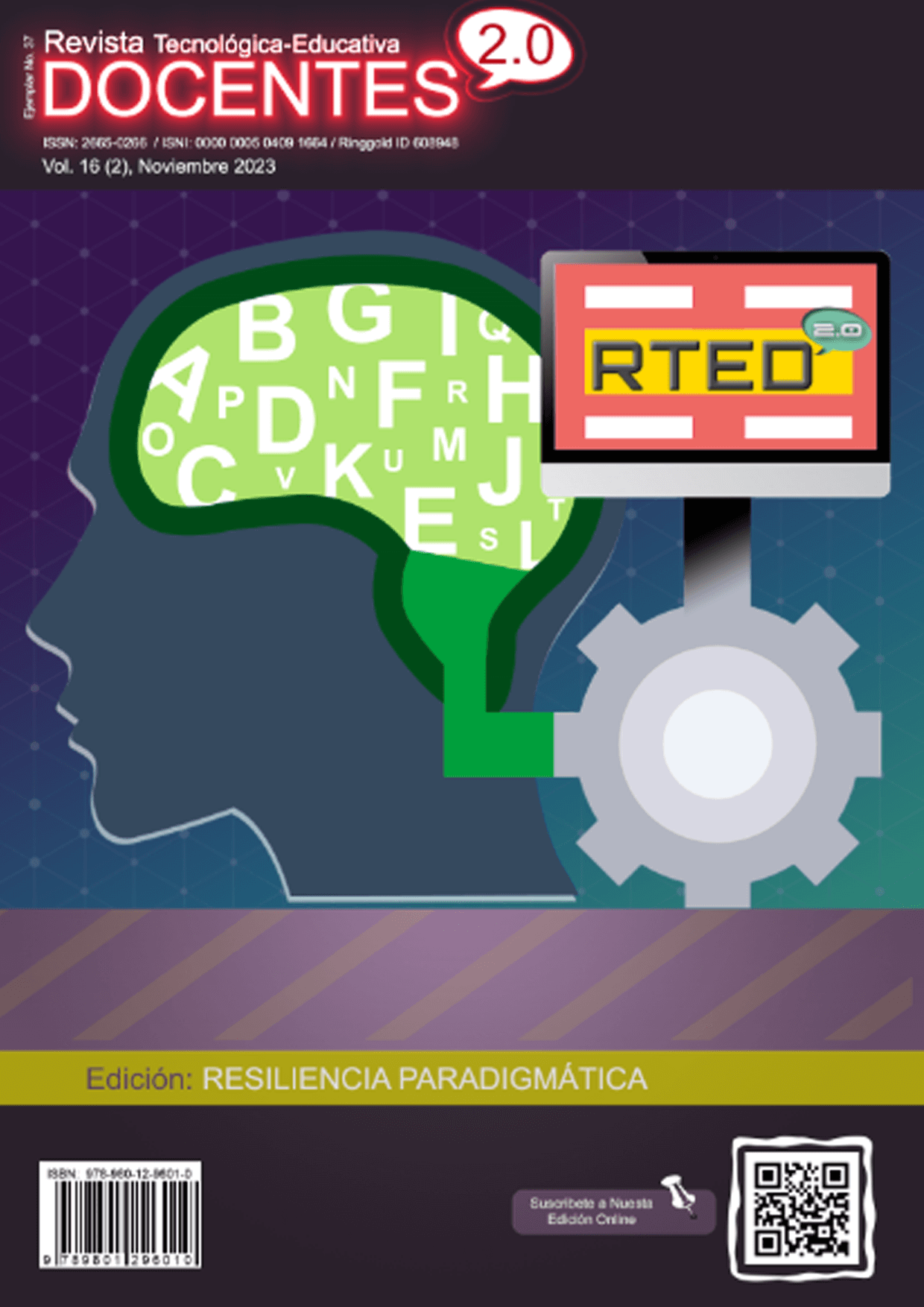Gamification as a Didactic Methodology in the Teaching of Consecutive Interpretation
 DOI:
https://doi.org/10.37843/rted.v16i2.379
DOI:
https://doi.org/10.37843/rted.v16i2.379
Main Article Content
Abstract
Teaching methodologies involve strategies used in educational contexts to optimize learning and achieve specific objectives. Numerous studies have addressed this issue of its effectiveness, and another of the fundamental elements in this field will be to investigate the effects that these have on the development of competencies inherent to a profession. The objective of this investigative work was to determine the effects of the use of gamification concerning the concepts of memory and note-taking in the teaching of consecutive interpreting according to the perceptions of the student body. The exploration was based on an inductive-deductive method with a pragmatic paradigm, a mixed approach, a case study design, and a concurrent type. A methodological intervention was carried out in the classroom with 24 subjects. The results obtained through a questionnaire suggest that using this methodology can have a positive impact as long as the available resources are used strategically and frequently. The relevance of this exploration lies in the need to cover different aspects of training environments that align with a profession's particularities.
Downloads
Metrics
Article Details

This work is licensed under a Creative Commons Attribution-NonCommercial-NoDerivatives 4.0 International License.
Those authors who have publications in our journal accept the following terms:
- When a work is accepted for publication, the author retains rights of reproduction, distribution of his/her article for exploitation in all countries of the world in the format provided by our magazine and any other magnetic medium, optical, and digital.
- Authors will retain their copyright and guarantee the journal the right first to publish their work, which will be simultaneously subject to the Creative Commons Acknowledgment License (Attribution-NonCommercial-NoDerivatives 4.0 International (CC BY-NC-ND 4.0)). That allows third parties to copy and redistribute the material in any medium or format, under the following conditions: Acknowledgment - You must properly acknowledge authorship, provide a link to the license, and indicate if any changes have been made. You may do so in any reasonable way, but not in a way that suggests you have the licensor's endorsement or receive it for your use. NonCommercial - You may not use the material for a commercial purpose. NoDerivatives - If you remix, transform, or build from the material, you cannot broadcast the modified material. There are no additional restrictions - You cannot apply legal terms or technological measures that legally restrict you from doing what the license allows.
- Authors may adopt other non-exclusive license agreements to distribute the published version of the work (e.g., deposit it in an institutional archive or publish it in a monographic volume) provided that the initial publication in this journal is indicated.
- Authors are allowed and recommended to disseminate their work through the Internet (e.g., in institutional telematic archives, repositories, libraries, or their website), producing exciting exchanges and increasing the published work's citations.
- Request of withdrawal an article has to be done in writing by the author to the Editor, becoming effective after a written response from the Editor. For this purpose, the author or authors will send correspondence via e-mail: [email protected].
- The author will not receive financial compensation for the publication of his work.
- All Docentes 2.0 Journal publications are under the Open Journal System (OJS) platform at: https://ojs.docentes20.com/.
References
Libertad, 9(2), 205-216. https://doi.org/10.18041/2382-3240/saber.2014v9n2.2119 DOI: https://doi.org/10.18041/2382-3240/saber.2014v9n2.2119
García-Oya, E. (2019). Primeros pasos y ejercicios introductorios para el estudiante de interpretación consecutiva. Redit, 13, 52-66. https://dialnet.unirioja.es/servlet/articulo?codigo=7699769 DOI: https://doi.org/10.24310/REDIT.2019.v0i13.10362
Gutiérrez-Artacho, J. & Olvera Lobo, M. D. (2016). Gamificación para la adquisición de competencias en la educación superior: el caso de la traducción e interpretación. En VV. AA. (Padilla Castillo, dir), Aulas virtuales, fórmulas y prácticas. McGraw Hill Education.
Jiménez-Chaves, V. E. (2012). El estudio de caso y su implementación en la investigación. Revista Internacional de Investigación en Ciencias Sociales, 1 (8), 141-150.
Ortiz-Colón, A.-M., Jordán, J. & Agredal, M. (2018). gamificación en educación: Una panorámica sobre el estado de la cuestión. Educação e Pesquisa, 44. https://doi.org/10.1590/S1678-4634201844173773 DOI: https://doi.org/10.1590/s1678-4634201844173773
Pereira-Pérez, Z. (2011). Los diseños de método mixto en la investigación en educación: Una experiencia concreta. Revista Electrónica Educare, XV (1), pp. 15-29. DOI: https://doi.org/10.15359/ree.15-1.2
Prieto-Andreu, J. M. (2020). Una revisión sistemática sobre gamificación, motivación y aprendizaje en universitarios. Teoría de la Educación. Revista Interuniversitaria, 32(1), p. 73-99. https://doi.org/10.14201/teri.20625 DOI: https://doi.org/10.14201/teri.20625
Rodríguez, A., & Pérez, A. O. (2017). Métodos científicos de indagación y de construcción del conocimiento. Revista EAN, 82, 179-200. https://doi.org/10.21158/01208160.n82.2017.1647 DOI: https://doi.org/10.21158/01208160.n82.2017.1647
Trejo-González, H. (2020). Experiencia de gamificación para la enseñanza de un segundo idioma. Educación y Educadores, 23(4), 611–633. https://doi.org/10.5294/edu.2020.23.4.4 DOI: https://doi.org/10.5294/edu.2020.23.4.4
Vázquez y del Árbol, E. (2004). Calidad en la interpretación. Ejercicios para mejorar la formación del intérprete en el aula. Jornadas sobre la Formación y Profesión del Traductor e Intérprete. https://n9.cl/goasb






